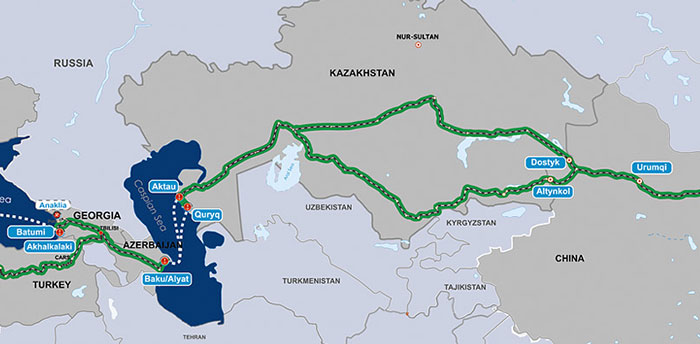Kyrgyzstan, Turkmenistan To Increase Road Transport Connectivity As Middle Corridor Develops
Kyrgyzstan’s Minister of Transport and Communications, Tilek Tekebayev has held meetings with Annadurdy Kosaev, the Chairman of the Turkmendeniz Deryayollary Transport agency at Turkmenbashi port, according to the Kyrgyz Ministry of Transport.
During the meeting, both parties outlined intentions to strengthen cooperation in increasing road cargo transport, through the creation of new logistics supply chains for goods and transport corridors.
Tekebayev stated that “Kyrgyz carriers can transfer cargo by road to the Uzbek-Turkmen border and reload it onto containers by rail and take it to the port of Turkmenbashi, where there are all conditions for reloading from rail transport.”
At present, mainly, Turkmen permit forms are used by Kyrgyz carriers for transit through the territory of Turkmenistan to Iran, Türkiye, and the European Union. Bilateral trade between Kyrgyzstan and Turkmenistan must travel via Uzbekistan.
The decision to develop road cargo transport between the two countries has four major effects:
Kyrgyzstan Impact
For landlocked Kyrgyzstan, routes through Turkmenistan to the Turkmenbashi Caspian Sea Port give it access to the INSTC network. Turkmenistan officially joined the INSTC in September. The INSTC is a road, rail and maritime and transport network that runs North-South via Iran, connecting with Iran’s Caspian Sea Ports at Anzali and the Persian Gulf Sea ports at Chabahar. From Anzali (or Turkmenbashi) goods can travel north to Russia’s Astrakhan Caspian Sea Ports, West to Baku in Azerbaijan and onward transit to Turkiye and the European Union, or South via Iran and the Gulf to markets in the Middle East, East Africa, India, and South Asia.
Turkmenistan Impact
The development of rod haulage with Kyrgyzstan will cement both Turkmenistan’s newly endorsed function as a transit route from Central Asia both West to Europe, and East to China, while also helping develop Turkmenistan’s Caspian Sea maritime potential. Chinese logistics companies have already been evaluating the Turkmen market and are looking for business opportunities in this area.
Uzbekistan Impact
Bilateral trade between Kyrgyzstan and Turkmenistan must travel via Uzbekistan. A route between the two provides an alternative, southern Middle Corridor avoiding Kazakhstan and thus providing an alternative to the main EU-Kazakh-China route. Uzbekistan however is also developing additional road and rail connectivity with Chinese assistance and including routes through to Afghanistan. Turkmenistan-Uzbekistan freight rail capacity has also been increasing, and improved road haulage networks either side of Uzbekistan will also help develop Uzbekistan’s trade potential.
Middle Corridor Impact
Improved road haulage capability will also further develop the capabilities of the Middle Corridor overland routes from Europe to Central Asia and onto China. The European Union for example has an extensive trade agreement with Uzbekistan, non-perishable products can be transported more effectively and less expensively via overland road and rail routes, and this will assist other Central Asian nations with connectivity with Kyrgyzstan and Turkmenistan reach EU markets – and vice versa.

Kyrgyzstan-Turkmenistan Bilateral Trade
Kyrgyzstan-Turkmenistan bilateral trade is currently running at about US$30 million, a relatively small amount, but this has effectively tripled in the last two years as geopolitics and a lessening of strategic tensions has proven a boost to trade. The main products that Turkmenistan exported to Kyrgyzstan are Tomatoes, Linens, and Ceramics. The main products that Kyrgyzstan exports to Turkmenistan are Electric Filament, Chocolate, and Potatoes. The main area of trade growth between them however will be in the services sector as the countries develop as transit corridors between Europe and China.
Kyrgyzstan is a member of the Eurasian Economic Union and Commonwealth of Independent States, both of which have expanding trade during 2022. Turkmenistan is not a member of either, however maintains observer status with the EAEU and may be a potential member in the future
Related Reading





